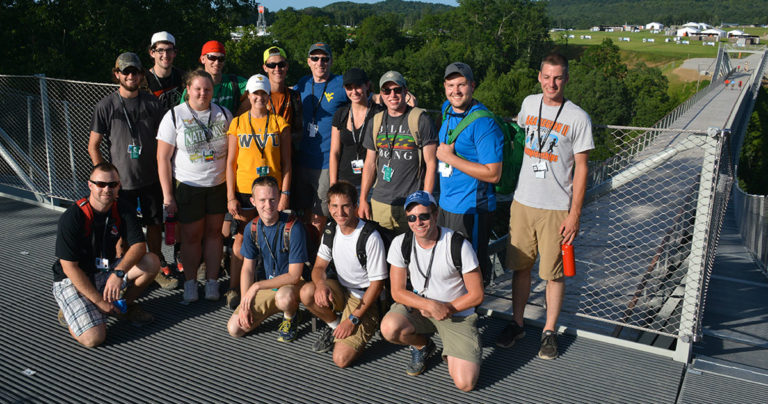The Summit Bechtel Reserve and West Virginia University: a match made in (almost) heaven

If you lived near the Summit Bechtel Reserve in West Virginia, you’d want to return again and again.
Its beautiful rolling hills, wide-open spaces and world-class adventure activities are magnetic.
That must explain why West Virginia University — geographically one of the closest universities to the BSA’s newest high-adventure base — has expanded an ongoing partnership with SBR.
They see the appeal of a major outdoor facility located just three hours away. They, too, want to return again and again.
Like all of the best partnerships, this one benefits both sides. Scouts get access to the brainpower provided by a first-rate research university. WVU gets access to a first-rate outdoor adventure destination.
Everybody wins.

A strategic partnership
Last month, I sat down with Greg Corio, executive director of Student Recreation and Outdoor Education at WVU, and Matt Monroe, team leader of outdoor programs at SBR, to talk about this strategic partnership.
The most visible part of the WVU-SBR alliance occurs every four years at the National Scout Jamboree. In 2013, 70 members of the WVU faculty and student body volunteered at the event.
In 2017, as in 2013, WVU students and faculty will run a forensics-science tent where Scouts and Venturers can examine a mock crime scene. They look for patterns, digital evidence, fingerprints, footprints and tool marks. Those who participate will receive a patch; 5,802 such patches were handed out in 2013.
Using some well-designed, strategically posted signage, WVU explains the physics behind some of the jamboree and SBR’s most popular attractions, such as mountain biking, rock climbing and zip lining. There are even companion websites. In fact, WVU’s “The Science of Riding a Zip Line” site is already live in you want to take a look.
Instead of just knowing that a zip line is fun, Scouts and Venturers will uncover the physics behind that thrilling experience (and, yes, have something entertaining to look at while in line).

More than the jamboree
WVU also offers STEM programs for Scouts at SBR. The school’s Davis College of Agriculture, Natural Resources and Design and the Eberly College of Arts and Sciences introduces Scouts to STEM fields.
Scouts use SBR’s wild habitat areas, coupled with its blanketed Wi-Fi coverage, to collect and store data and learn about water quality, ecosystems, climate change and wetlands ecology.
But Scouts aren’t the only ones learning at the property. WVU students earn academic credit through activities completed at the site. WVU medical students use SBR to gather hands-on experience with treating illness and injury.
At WVU Tech in nearby Beckley, W.Va., students will use SBR’s vast property to earn a degree in adventure recreation management.
It’s like I said: Everybody wins.
The Summit Bechtel Reserve and West Virginia University: a match made in (almost) heaven
